Fleurs du Mal Magazine


Or see the index
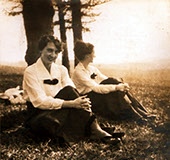
Choice
Imperious Time, I must prefer
Thy just necessity:
Resign the silent, earlier
Beliefs grown dear to me.
The stillness left alternatives
To youth, a freedom wide
And dim as dreaming, but man lives,
And must one day decide.
There is a doom the years compel:
I must approach the goal
Decreed, where it behooves me dwell:
I must declare my soul;
Must speak and choose what stars pertain
To me ; needs must I rest
In their most intimate beams, remain
Committed and confessed.
I claim a tent of stars in place
Of heaven’s confusing dome:
A tent of stars in a dark space —
The sky must be my home.
Gladys Cromwell
(1885-1919)
Choice
From: Poems 1919
• fleursdumal.nl magazine
More in: Archive G-H, Cromwell, Gladys, Gladys Cromwell
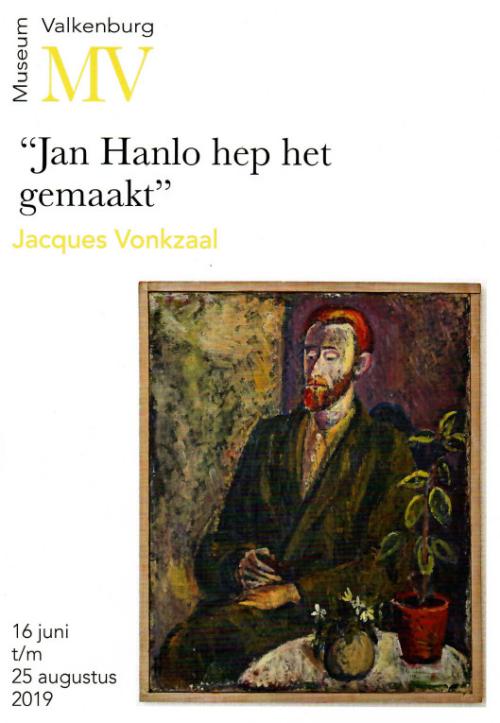
Op 16 juni 2019 was het vijftig jaar geleden dat de dichter Jan Hanlo overleed. Museum Valkenburg gedenkt Jan Hanlo met een mooie expositie van zijn werk in de Jacques Vonkzaal.
Afgelopen maanden heeft een werkgroep van Jan Hanlo-kenners – dichter en letterkundige Wiel Kusters, Ser J.L. Prop en Jan Schurgers – met vertegenwoordigers van het museum de tentoonstelling voorbereid. Stukken uit de nalatenschap van Hanlo in het Literatuurmuseum in Den Haag zijn doorvorst en geselecteerd. Niet alleen zijn literaire werk is vertegenwoordigd, ook zijn er aquarellen en kindertekeningen van Jan Hanlo te zien. Prof. Wiel Kusters noemt de expositie een waardige hommage aan een groot en oorspronkelijk dichter.
Johannes Bernardus Maria Raphaël Hanlo (1912–1969) woonde een groot deel van zijn leven in Valkenburg. Hij werd in 1912 geboren in Bandung, het toenmalige Nederlands Indië. Zijn vader was voorzitter van de Landraad in Bandung, zijn moeder dochter van een Deurnese gemeente arts. Nog in het jaar van zijn geboorte scheidden zijn ouders en kwam moeder met Jan terug naar Deurne.
In 1927 namen ze hun intrek in Valkenburg. Jan werd als 15-jarige ingeschreven op het Sint Bernardinuscollege in Heerlen. Als scholier schreef hij al zijn eerste gedichten. Na het eindexamen volgde een studie M.O. Engels en in 1942 ging hij psychologie studeren in Amsterdam. Tot 1958 werkte Hanlo als leraar Engels aan Instituut Schoevers in Amsterdam. Door ziekte van zijn moeder besloot hij definitief naar Valkenburg terug te keren. Na haar overlijden bleef hij tot zijn dood in Valkenburg wonen, in het poortwachtershuisje van Geerlingshof in Strabeek.
De tentoonstelling in Museum Valkenburg bestaat uit documenten, foto’s en teksten, afkomstig uit de collectie van het Literatuurmuseum in Den Haag en uit particuliere verzamelingen.
Tot en met zondag 25 augustus 2019 in Museum Land van Valkenburg, Valkenburg (LB): ‘Jan Hanlo hep het gemaakt’.
Museum Land van Valkenburg
Grotestraat Centrum 31
6301 CW Valkenburg
+31 43 601 6394
Website: https://www.museumvalkenburg.nl/
• fleursdumal.nl magazine
More in: #Archive A-Z Sound Poetry, *Concrete + Visual Poetry F-J, - Book Stories, Archive G-H, Archive G-H, Art & Literature News, Hanlo, Jan, Literary Events, Wiel Kusters

L’Enfant
Les turcs ont passé là. Tout est ruine et deuil.
Chio, l’île des vins, n’est plus qu’un sombre écueil,
Chio, qu’ombrageaient les charmilles,
Chio, qui dans les flots reflétait ses grands bois,
Ses coteaux, ses palais, et le soir quelquefois
Un chœur dansant de jeunes filles.
Tout est désert. Mais non ; seul près des murs noircis,
Un enfant aux yeux bleus, un enfant grec, assis,
Courbait sa tête humiliée ;
Il avait pour asile, il avait pour appui
Une blanche aubépine, une fleur, comme lui
Dans le grand ravage oubliée.
Ah ! pauvre enfant, pieds nus sur les rocs anguleux !
Hélas ! pour essuyer les pleurs de tes yeux bleus
Comme le ciel et comme l’onde,
Pour que dans leur azur, de larmes orageux,
Passe le vif éclair de la joie et des jeux,
Pour relever ta tête blonde,
Que veux-tu ? Bel enfant, que te faut-il donner
Pour rattacher gaîment et gaîment ramener
En boucles sur ta blanche épaule
Ces cheveux, qui du fer n’ont pas subi l’affront,
Et qui pleurent épars autour de ton beau front,
Comme les feuilles sur le saule ?
Qui pourrait dissiper tes chagrins nébuleux ?
Est-ce d’avoir ce lys, bleu comme tes yeux bleus,
Qui d’Iran borde le puits sombre ?
Ou le fruit du tuba, de cet arbre si grand,
Qu’un cheval au galop met, toujours en courant,
Cent ans à sortir de son ombre ?
Veux-tu, pour me sourire, un bel oiseau des bois,
Qui chante avec un chant plus doux que le hautbois,
Plus éclatant que les cymbales ?
Que veux-tu ? fleur, beau fruit, ou l’oiseau merveilleux ?
– Ami, dit l’enfant grec, dit l’enfant aux yeux bleus,
Je veux de la poudre et des balles.
8-10 juillet 1828
Victor Hugo
(1802-1885)
L’Enfant
(Poème)
Les Orientales
• fleursdumal.nl magazine
More in: Archive G-H, Archive G-H, Hugo, Victor, Victor Hugo

Le poëte
Shakspeare songe ; loin du Versaille éclatant,
Des buis taillés, des ifs peignés, où l’on entend
Gémir la tragédie éplorée et prolixe,
Il contemple la foule avec son regard fixe,
Et toute la forêt frissonne devant lui.
Pâle, il marche, au dedans de lui-même ébloui ;
Il va, farouche, fauve, et, comme une crinière,
Secouant sur sa tête un haillon de lumière.
Son crâne transparent est plein d’âmes, de corps,
De rêves, dont on voit la lueur du dehors ;
Le monde tout entier passe à travers son crible ;
Il tient toute la vie en son poignet terrible ;
Il fait sortir de l’homme un sanglot surhumain.
Dans ce génie étrange où l’on perd son chemin,
Comme dans une mer, notre esprit parfois sombre.
Nous sentons, frémissants, dans son théâtre sombre,
Passer sur nous le vent de sa bouche soufflant,
Et ses doigts nous ouvrir et nous fouiller le flanc.
Jamais il ne recule ; il est géant ; il dompte
Richard-Trois, léopard, Caliban, mastodonte ;
L’idéal est le vin que verse ce Bacchus.
Les sujets monstrueux qu’il a pris et vaincus
Râlent autour de lui, splendides ou difformes ;
Il étreint Lear, Brutus, Hamlet, êtres énormes,
Capulet, Montaigu, César, et, tour à tour,
Les stryges dans le bois, le spectre sur la tour ;
Et, même après Eschyle, effarant Melpomène,
Sinistre, ayant aux mains des lambeaux d’âme humaine,
De la chair d’Othello, des restes de Macbeth,
Dans son œuvre, du drame effrayant alphabet,
Il se repose ; ainsi le noir lion des jongles
S’endort dans l’antre immense avec du sang aux ongles.
Paris, avril 1835.
Victor Hugo
(1802-1885)
Le poëte
(Poème)
Les Contemplations
• fleursdumal.nl magazine
More in: Archive G-H, Archive G-H, Hugo, Victor, Victor Hugo
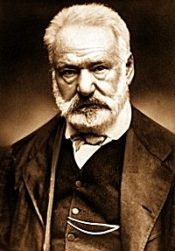
Exil
Si je pouvais voir, ô patrie,
Tes amandiers et tes lilas,
Et fouler ton herbe fleurie,
Hélas !
Si je pouvais, – mais, ô mon père,
O ma mère, je ne peux pas, –
Prendre pour chevet votre pierre,
Hélas !
Dans le froid cercueil qui vous gêne,
Si je pouvais vous parler bas,
Mon frère Abel, mon frère Eugène,
Hélas !
Si je pouvais, ô ma colombe,
Et toi, mère, qui t’envolas,
M’agenouiller sur votre tombe,
Hélas !
Oh ! vers l’étoile solitaire,
Comme je lèverais les bras !
Comme je baiserais la terre,
Hélas !
Loin de vous, ô morts que je pleure,
Des flots noirs j’écoute le glas ;
Je voudrais fuir, mais je demeure,
Hélas !
Pourtant le sort, caché dans l’ombre,
Se trompe si, comptant mes pas,
Il croit que le vieux marcheur sombre
Est las.
Victor Hugo
(1802-1885)
Exil
(Poème)
• fleursdumal.nl magazine
More in: Archive G-H, Archive G-H, Hugo, Victor, Victor Hugo
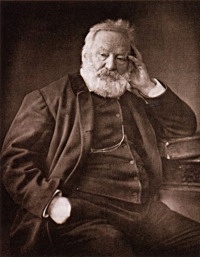
Le poète dans les révolutions
” Le vent chasse loin des campagnes
Le gland tombé des rameaux verts ;
Chêne, il le bat sur les montagnes ;
Esquif, il le bat sur les mers.
Jeune homme, ainsi le sort nous presse.
Ne joins pas, dans ta folle ivresse,
Les maux du monde à tes malheurs ;
Gardons, coupables et victimes,
Nos remords pour nos propres crimes,
Nos pleurs pour nos propres douleurs. “
Quoi ! mes chants sont-ils téméraires ?
Faut-il donc, en ces jours d’effroi,
Rester sourd aux cris de ses frères !
Ne souffrir jamais que pour soi !
Non, le poëte sur la terre
Console, exilé volontaire,
Les tristes humains dans leurs fers ;
Parmi les peuples en délire,
Il s’élance, armé de sa lyre,
Comme Orphée au sein des enfers.
” Orphée aux peines éternelles
Vint un moment ravir les morts ;
Toi, sur les têtes criminelles,
Tu chantes l’hymne du remords.
Insensé ! quel orgueil t’entraîne ?
De quel droit vien§-tu dans l’arène
Juger sans avoir combattu ?
Censeur échappé de l’enfance,
Laisse vieillir ton innocence,
Avant de croire à ta vertu. “
Quand le crime, Python perfide,
Brave, impuni, le frein des lois,
La Muse devient l’Euménide,
Apollon saisit son carquois.
Je cède au Dieu qui me rassure ;
J’ignore à ma vie encor pure
Quels maux le sort veut attacher ;
Je suis sans orgueil mon étoile ;
L’orage déchire la voile
La voile sauve le nocher.
” Les hommes vont aux précipices.
Tes chants ne les sauveront pas.
Avec eux, loin des cieux propices,
Pourquoi donc égarer tes pas ?
Peux-tu, dès tes jeunes années,
Sans briser d’autres destinées,
Rompre la chaîne de tes jours ?
Épargne ta vie éphémère :
Jeune homme, n’as-tu pas de mère ?
Poëte, n’as-tu pas d’amours ? “
Eh bien, à mes terrestres flammes,
Si je meurs, les cieux vont s’ouvrir.
L’amour chaste agrandit les âmes,
Et qui sait aimer sait mourir.
Le poëte, en des temps de crime,
Fidèle aux justes qu’on opprime,
Célèbre, imite les héros ;
Il a, jaloux de leur martyre,
Pour les victimes une lyre,
Une tête pour les bourreaux.
” On dit que jadis le poëte,
Chantant des jours encor lointains,
Savait à la terre inquiète
Révéler ses futurs destins.
Mais toi, que peux-tu pour le monde ?
Tu partages sa nuit profonde ;
Le ciel se voile et veut punir ;
Les lyres n’ont plus de prophète,
Et la Muse, aveugle et muette,
Ne sait plus rien de l’avenir ! “
Le mortel qu’un Dieu même anime
Marche à l’avenir, plein d’ardeur ;
C’est en s’élançant dans l’abîme
Qu’il en sonde la profondeur.
Il se prépare au sacrifice ;
Il sait que le bonheur du vice
Par l’innocent est expié ;
Prophète à son jour mortuaire,
La frison est son sanctuaire,
Et l’échafaud est son trépied.
” Que n’est-tu né sur les rivages
Des Abbas et des Cosroës,
Aux rayons d’un ciel sans nuages,
Parmi le myrte et l’aloès !
Là, sourd aux maux que tu déplores,
Le poëte voit ses aurores
Se lever sans trouble et sans pleurs ;
Et la colombe, chère aux sages,
Porte aux vierges ses doux messages
Où l’amour parle avec des fleurs ! “
Qu’un autre au céleste martyre
Préfère un repos sans honneur !
La gloire est le but où j’aspire ;
On n’y va point par le bonheur.
L’alcyon, quand l’océan gronde,
Craint que les vents ne troublent l’onde
Où se berce son doux sommeil ;
Mais pour l’aiglon, fils des orages,
Ce n’est qu’à travers les nuages
Qu’il prend son vol vers le soleil !
Victor Hugo
(1802-1885)
Le poète dans les révolutions
(Poème)
• fleursdumal.nl magazine
More in: Archive G-H, Archive G-H, Hugo, Victor, Victor Hugo
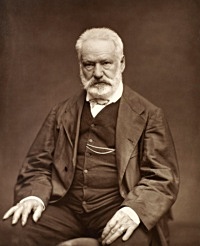
Chanson de grand-père
Dansez, les petites filles,
Toutes en rond.
En vous voyant si gentilles,
Les bois riront.
Dansez, les petites reines,
Toutes en rond.
Les amoureux sous les frênes
S’embrasseront.
Dansez, les petites folles,
Toutes en rond.
Les bouquins dans les écoles
Bougonneront.
Dansez, les petites belles,
Toutes en rond.
Les oiseaux avec leurs ailes
Applaudiront.
Dansez, les petites fées,
Toutes en rond.
Dansez, de bleuets coiffées,
L’aurore au front.
Dansez, les petites femmes,
Toutes en rond.
Les messieurs diront aux dames
Ce qu’ils voudront.
Victor Hugo
(1802-1885)
Chanson de grand-père
(Poème)
• fleursdumal.nl magazine
More in: Archive G-H, Archive G-H, Hugo, Victor, Victor Hugo

Il fait froid
L’hiver blanchit le dur chemin
Tes jours aux méchants sont en proie.
La bise mord ta douce main ;
La haine souffle sur ta joie.
La neige emplit le noir sillon.
La lumière est diminuée…
Ferme ta porte à l’aquilon !
Ferme ta vitre à la nuée !
Et puis laisse ton coeur ouvert !
Le coeur, c’est la sainte fenêtre.
Le soleil de brume est couvert ;
Mais Dieu va rayonner peut-être !
Doute du bonheur, fruit mortel ;
Doute de l’homme plein d’envie ;
Doute du prêtre et de l’autel ;
Mais crois à l’amour, ô ma vie !
Crois à l’amour, toujours entier,
Toujours brillant sous tous les voiles !
A l’amour, tison du foyer !
A l’amour, rayon des étoiles !
Aime, et ne désespère pas.
Dans ton âme, où parfois je passe,
Où mes vers chuchotent tout bas,
Laisse chaque chose à sa place.
La fidélité sans ennui,
La paix des vertus élevées,
Et l’indulgence pour autrui,
Eponge des fautes lavées.
Dans ta pensée où tout est beau,
Que rien ne tombe ou ne recule.
Fais de ton amour ton flambeau.
On s’éclaire de ce qui brûle.
A ces démons d’inimitié
Oppose ta douceur sereine,
Et reverse leur en pitié
Tout ce qu’ils t’ont vomi de haine.
La haine, c’est l’hiver du coeur.
Plains-les ! mais garde ton courage.
Garde ton sourire vainqueur ;
Bel arc-en-ciel, sors de l’orage !
Garde ton amour éternel.
L’hiver, l’astre éteint-il sa flamme ?
Dieu ne retire rien du ciel ;
Ne retire rien de ton âme !
Victor Hugo
(1802-1885)
Il fait froid
(Poème)
• fleursdumal.nl magazine
More in: Archive G-H, Archive G-H, Hugo, Victor, Victor Hugo
In Zebra, a boy steps tentatively from the shadows onto a strobe-lit dancefloor.
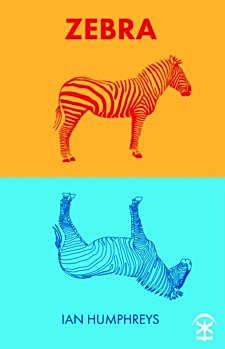 Ian Humphreys’ much-anticipated debut shimmers with music, wit and humour while exploring mixed identities, otherness, and coming-of-age as a gay man in 1980s Manchester.
Ian Humphreys’ much-anticipated debut shimmers with music, wit and humour while exploring mixed identities, otherness, and coming-of-age as a gay man in 1980s Manchester.
These acutely-observed, joyful poems pay homage to those who took the first steps – minority writers, LGBT civil rights activists, 70s queer night-clubbers and the poet’s own mixed-race parents.
A heady cocktail of the playful, political and mythical, Humphreys’ Zebra is also a creature of opposites – light and dark, countryside and cityscape, highs and lows. The collection moves from semi-rural England to the metropolitan hubs of Hong Kong, London and New York, circling its subjects, often finding the uncanny in the familiar, always drawing the reader centre-stage.
Ian’s debut full-length collection of poetry, Zebra, is forthcoming from Nine Arches Press in Spring, 2019. A portfolio of his poems was published in 2017 by Bloodaxe in Ten: Poets of the New Generation. His work has featured in magazines and anthologies, such as The Poetry Review, The Rialto, Ambit, Magma and The Forward Book of Poetry.
Ian Humphreys has won a number of awards, including first prize in both the 2016 Hamish Canham Prize and the 2013 PENfro Open Poetry Competition. In 2018, he was Highly Commended in the Forward Prizes for Poetry. Ian has also been published internationally in overseas journals and anthologies. His fiction has been shortlisted three times for the Bridport Prize.
Ian Humphreys has had work featured in journals and anthologies such as The Poetry Review, The Rialto, Magma and The Forward Book of Poetry 2019. Awards include first prize in the Poetry Society’s Hamish Canham Prize. He has been highly commended in the Forward Prizes for Poetry, and two of his poems have been longlisted in the National Poetry Competition. Ian is a fellow of The Complete Works, which promotes diversity, quality and innovation in British poetry. A portfolio of his poems is published in Ten: Poets of the New Generation (Bloodaxe).
Zebra
Ian Humphreys
Poetry
Format Paperback
80 pages
Dimensions 150 x 210 x 22mm
Publication date 11 Apr 2019
Publisher Nine Arches Press
Publication City/Country Rugby, United Kingdom
Language English
ISBN10 1911027700
ISBN13 9781911027706
Cover artwork: Louise Crosby
BIC Code: DCF
€15,99
# new poetry
Ian Humphreys
Zebra
• fleursdumal.nl magazine
More in: - Book News, - Book Stories, Archive G-H, Archive G-H, Art & Literature News, Riding a Zebra
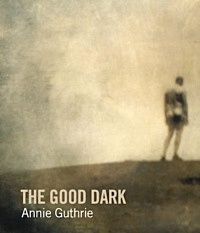 In the sequence of poems comprising Annie Guthrie’s first book, the quest for the meaning of human consciousness and its tangled subjectivity is drawn as a slow-building narrative of the mystic experience.
In the sequence of poems comprising Annie Guthrie’s first book, the quest for the meaning of human consciousness and its tangled subjectivity is drawn as a slow-building narrative of the mystic experience.
The journey enacted is that of the self as character, who encounters insurmountable mysteries in a breaking selfhood.
A dossier of contemplative exploration, THE GOOD DARK chronicles an immersive search in three acts: Unwitting, Chorus, and Body: stations through which the character must pass, and where she is accumulatively confessed, compounded and erased.
the gossip
I don’t always want what we have, she is saying.
Outside, dark clouds, fish hopping, tilling waves
back from shore. He is silent.
Sometimes more is happening, he says, finally.
The sun’s coming up, she says. Look how the light is kept.
I’d like to keep it up, he says.
Don’t make apart when otherwise the same, he says.
She is silent, tilling shore back from shore.
Don’t give darkness a face, he says, darkening.
Annie Guthrie is a writer and jeweler living in Tucson. She has a metalsmithing studio at Splinter Brothers Warehouse and can be found through her website, www.annieguthrie.net. She teaches at the University of Arizona Poetry Center and also mentors select students wishing to apprentice in poetry or to further their art projects through her courses in “Oracular Writing.”
The Good Dark
by Annie Guthrie
Paperback: 68 pages
Publisher: Tupelo Press, Inc.
2015
Language: English
ISBN-10: 1936797593
ISBN-13: 978-1936797592
Categories: Poetry
$16.95
# more poetry
The Good Dark
by Annie Guthrie
• fleursdumal.nl magazine
More in: - Bookstores, Archive G-H, Archive G-H, Art & Literature News

Guerre civile
La foule était tragique et terrible ; on criait :
À mort ! Autour d’un homme altier, point inquiet,
Grave, et qui paraissait lui-même inexorable,
Le peuple se pressait : À mort le misérable !
Et lui, semblait trouver toute simple la mort.
La partie est perdue, on n’est pas le plus fort,
On meurt, soit. Au milieu de la foule accourue,
Les vainqueurs le traînaient de chez lui dans la rue.
— À mort l’homme ! — On l’avait saisi dans son logis ;
Ses vêtements étaient de carnage rougis ;
Cet homme était de ceux qui font l’aveugle guerre
Des rois contre le peuple, et ne distinguent guère
Scévola de Brutus, ni Barbès de Blanqui ;
Il avait tout le jour tué n’importe qui ;
Incapable de craindre, incapable d’absoudre,
Il marchait, laissant voir ses mains noires de poudre ;
Une femme le prit au collet : « À genoux !
C’est un sergent de ville. Il a tiré sur nous !
— C’est vrai, dit l’homme. — À bas ! à mort ! qu’on le fusille !
Dit le peuple. — Ici ! Non ! Plus loin ! À la Bastille !
À l’arsenal ! Allons ! Viens ! Marche ! — Où vous voudrez »,
Dit le prisonnier. Tous, hagards, les rangs serrés,
Chargèrent leurs fusils. « Mort au sergent de ville !
Tuons-le comme un loup ! — Et l’homme dit, tranquille :
— C’est bien, je suis le loup, mais vous êtes les chiens.
— Il nous insulte ! À mort ! » Les pâles citoyens
Croisaient leurs poings crispés sur le captif farouche ;
L’ombre était sur son front et le fiel dans sa bouche ;
Cent voix criaient : « À mort ! À bas ! Plus d’empereur ! »
On voyait dans ses yeux un reste de fureur
Remuer vaguement comme une hydre échouée ;
Il marchait poursuivi par l’énorme huée,
Et, calme, il enjambait, plein d’un superbe ennui,
Des cadavres gisants, peut-être faits par lui.
Le peuple est effrayant lorsqu’il devient tempête ;
L’homme sous plus d’affronts levait plus haut la tête ;
Il était plus que pris, il était envahi.
Dieu ! comme il haïssait ! comme il était haï !
Comme il les eût, vainqueur, fusillés tous ! « Qu’il meure !
Il nous criblait encor de balles tout à l’heure !
À bas cet espion, ce traître, ce maudit !
À mort ! c’est un brigand ! » Soudain on entendit
Une petite voix qui disait : « C’est mon père ! »
Et quelque chose fit l’effet d’une lumière.
Un enfant apparut. Un enfant de six ans.
Ses deux bras se dressaient suppliants, menaçants.
Tous criaient : « Fusillez le mouchard ! Qu’on l’assomme ! »
Et l’enfant se jeta dans les jambes de l’homme,
Et dit, ayant au front le rayon baptismal :
« Père, je ne veux pas qu’on te fasse de mal ! »
Et cet enfant sortait de la même demeure.
Les clameurs grossissaient : « À bas l’homme ! Qu’il meure !
À bas ! finissons-en avec cet assassin !
Mort ! » Au loin le canon répondait au tocsin.
Toute la rue était pleine d’hommes sinistres.
À bas les rois ! À bas les prêtres, les ministres,
Les mouchards ! Tuons tout ! c’est un tas de bandits ! »
Et l’enfant leur cria : « Mais puisque je vous dis
Que c’est mon père ! — Il est joli, dit une femme,
Bel enfant ! » On voyait dans ses yeux bleus une âme ;
Il était tout en pleurs, pâle, point mal vêtu.
Une autre femme dit : « Petit, quel âge as-tu ?
Et l’enfant répondit : — Ne tuez pas mon père ! »
Quelques regards pensifs étaient fixés à terre,
Les poings ne tenaient plus l’homme si durement.
Un de plus furieux, entre tous inclément,
Dit à l’enfant : « Va-t’en ! — Où ? — Chez toi. — Pourquoi faire ?
— Chez ta mère. — Sa mère est morte, dit le père.
— Il n’a donc plus que vous ? — Qu’est-ce que cela fait ? »
Dit le vaincu. Stoïque et calme, il réchauffait
Les deux petites mains dans sa rude poitrine,
Et disait à l’enfant : « Tu sais bien, Catherine ?
— Notre voisine ? — Oui. Va chez elle. — Avec toi ?
— J’irai plus tard. — Sans toi je ne veux pas. — Pourquoi ?
— Parce qu’on te ferait du mal. » Alors le père
Parla tout bas au chef de cette sombre guerre :
« Lâchez-moi le collet. Prenez-moi par la main,
Doucement. Je vais dire à l’enfant : À demain !
Vous me fusillerez au détour de la rue,
Ailleurs, où vous voudrez. — Et, d’une voix bourrue :
— Soit, dit le chef, lâchant le captif à moitié.
Le père dit : — Tu vois. C’est de bonne amitié.
Je me promène avec ces messieurs. Sois bien sage,
Rentre. » Et l’enfant tendit au père son visage,
Et s’en alla content, rassuré, sans effroi.
« Nous sommes à notre aise à présent, tuez-moi,
Dit le père aux vainqueurs ; où voulez-vous que j’aille ? »
Alors, dans cette foule où grondait la bataille,
On entendit passer un immense frisson,
Et le peuple cria : « Rentre dans ta maison ! »
Victor Hugo
(1802-1885)
Guerre civile
(Poème)
La Légende des siècles, 1877
• fleursdumal.nl magazine
More in: Archive G-H, Archive G-H, Hugo, Victor, Victor Hugo

Les innocents
Mais les enfants sont là. Le murmure qui sort
De ces âmes en fleur est-il compris du sort ?
L’enfant va devant lui gaîment ; mais la prière,
Quand il rit, parle-t-elle à quelqu’un en arrière ?
Le frais chuchotement du doux être enfantin
Attendrit-il l’oreille obscure du destin ?
Oh ! que d’ombre ! Tous deux chantent, fragiles têtes
Où flotte la lueur d’on ne sait quelles fêtes,
Et que dore un reflet d’un paradis lointain !
Les enfants ont des coeurs faits comme le matin
Ils ont une innocence étonnée et joyeuse ;
Et pas plus que l’oiseau gazouillant sous l’yeuse,
Pas plus que l’astre éclos sur les noirs horizons,
Ils ne sont inquiets de ce que nous faisons,
Ayant pour toute affaire et pour toute aventure
L’épanouissement de la grande nature ;
Ils ne demandent rien à Dieu que son soleil ;
Ils sont contents pourvu qu’un beau rayon vermeil
Chauffe les petits doigts de leur main diaphane
Et que le ciel soit bleu, cela suffit à Jeanne.
Victor Hugo
(1802-1885)
Les innocents
(Poème)
• fleursdumal.nl magazine
More in: Archive G-H, Archive G-H, Hugo, Victor, Victor Hugo
Thank you for reading Fleurs du Mal - magazine for art & literature